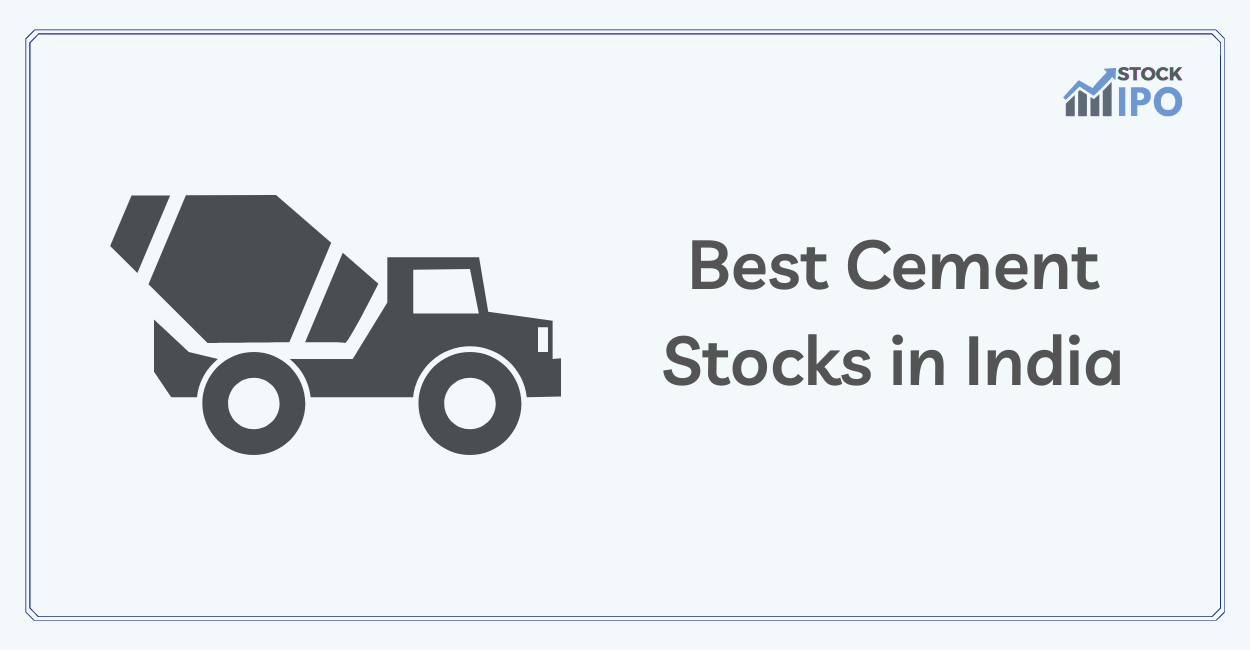The focus of the Indian government on Infrastructure is important and obvious when the country is in its prime years of growth and prosperity. With the growing demand for infra, the cement industry has become one of the most important industries in the past few years and has many more years where it will play a significant role. Keeping in mind the importance of this industry, the following article talks about the best cement stock companies in recent times. We will have a look at these ones by one.
Before we know about the best stocks, we first need to understand the current position of the cement industry in brief.
Cement Industry: Overview
India produces 7% of the world’s cement capacity and is the second-largest producer of cement in the world and the 3rd largest consumer. The industry was no exception and was heavily affected by the COVID-19 pandemic since all construction activities were put to a halt. However, it has been picking up its pace since then, and the demands are now on a rise again. The Indian demand for cement is expected to reach up to 550 to 600 MT by 2025.
The demand is also supported by the government schemes like MGNREGA, PM Garib Kalyan Rozgar Abhiyan and PM Awaas Yojana and their focus on public infrastructure.
Best Cement Stocks
The following are the best stocks in the cement industry –
| Name | Market Capitalization (Rs. Crore) |
|---|---|
| UltraTech Cement | 209,621 |
| Ambuja Cements | 67,929 |
| Dalmia Bharat | 34,382 |
| ACC Ltd | 32,519 |
| Grasim Industries | 103,936 |
| Shree Cement | 94,127 |
We will now take a look at these stocks –
1. UltraTech Cement

Other than being the top producer of cement in India, UltraTech Cement is the top producer and the most famous stock in Asia. They primarily deal in manufacturing and producing cement and products related to cement.
Quarterly Revenue of the company rose 19.5% YoY to Rs 15,647.5 Crores. The sector’s average revenue growth YoY for the quarter was 14.9%. The Annual Revenue rose 16.8%, in the last year to Rs 53,106.6 Crores. The debt-to-equity Ratio of 0.2 is less than 1 and healthy, which indicates that most of its assets are financed from equity. Return on Equity(ROE) for the last financial year was 14.6%, which is in the normal range of 10-20%.
2. Ambuja Cements

With its presence in as many as 80 countries, Ambuja Cements is without a doubt one of the biggest in the cement Industry.
The biggest red flag with this company is however that 100% of its promoters’ holdings are pledged. Which is not just high, but the whole of the holdings being pledged can push them into being a high-risk investment.
The debt-to-equity ratio of the company is however 0. The stock price even though rose by 8.9% in the previous year, it has underperformed when compared to its peers and the industry average.
What brings this stock into this list is its performance, where the PE Ratio is 35, lower than the industry, and the quarterly revenue rose 3.7% YoY to Rs 8,036.5 Crores, which is a good sign.
3. Dalmia Bharat

Founded in 1939, the company now has a business all over India and has over 30,000 dealers. The USP of the company is its special sulphate-resistant cement. Other than Cement, they are also involved in Sugar and refractories.
The PE ratio of the stock is 33, which is lower than the industry level of 37.5. The ratio becomes even more attractive when we see that the Quarterly Net profit rose by 98.1% YoY to Rs 204 Crores compared to its sector’s average net profit growth YoY for the quarter of -10.7%. The Debt to Equity Ratio of 0.2 is also healthy and a positive sign. Stock Price rose 17% and outperformed its sector in the previous year. Even though Mutual Fund Holding decreased by 0.1%, the company gave a decent annual revenue of 11,441 Crores, which was after a rise of 6.9%.
4. ACC Ltd.

ACC Ltd., was founded in 1936 and is a part of LafargeHolcim Group. Ambuja Cements Limited is the holding Company of ACC Ltd. The primary focus is local Indian markets. 90% of their revenue comes from Cement and 7% from their ready-to-mix concrete. Its average capacity utilization for the last 5 years was 79%.
Price to Earning Ratio is 50.1, indicating that the stock is expensive. The Return on Equity(ROE) for the last financial year was 13% and the Debt to Equity Ratio is zero. Stock Price fell 17.1% and has underperformed its sector by a whopping 27.9% in the past year. The Quarterly Net profit of the company also fell 59.7% YoY to Rs 113.2 Crores. Since the company is in its low phase currently, it can be a good time to put in money after taking on some more research.
5. Grasim Industries

Grasim Industries Limited is the flagship company of the Aditya Birla group, it ranks amongst India’s largest private sector companies. It was founded in 1947. Initially, it was a textile manufacturer but has expanded itself into various industries including the cement industry.
The Return on Equity(ROE) for the last financial year was just 10% indicating inefficient use of shareholder’s capital to generate profit. The price to earning Ratio is 12.6, which means that the stock is currently cheap. The Quarterly Net profit rose 44.1% YoY to Rs 2,515.8 Crores. The Annual Revenue rose 24.6%, in the last year to Rs 96,522.5 Crores. Stock Price fell 1.3% in the past year. The debt to Equity Ratio of 1, which is ideal, but compared to its peers, can be a little lower.
These factors indicate that same like ACC Ltd, Grasim too is in its low phase and the time can be good to make an investment, considering that the revenues and profits have been rising, hence the company does have potential.
6. Shree Cement

Shree Cement is engaged in the manufacturing and selling of cement and cement-related products and is one of the lowest-cost producers in the country. It is the 3rd largest cement producer in India with an installed capacity of 43.4 MTPA. The company sells cement under the brand name Roofon, Bangur Power, Shree Jung Rodhak, Bangur Cement, and Rock strong.
89% of its revenue comes from cement itself, and 4% comes from Clinker.
The PE Ratio of Shree Cement is 12.6 meaning that the stock is cheap since it is lower than its sector PE ratio of 36.7. Their Annual Revenue rose by 24.6%, in the last year to Rs 96,522.5 Crores and their annual Net Profit rose by 75.4% in the same period to Rs 7,549.8 Crores. Mutual Fund Holdings increased by 0.1% in the last quarter to 4.3.
Conclusion
Reading about the stocks we wish to have on our watch list isn’t enough. A self-done analysis and research are the best ways to truly realise the potential of the stock. Now, that you have a brief idea of what these companies are and very fundamental numbers of the stocks, it will make your further research about these companies way easier and help you make a final judgement and your own conclusions.








Thank you so much, Navya quick response
grate message regarding the cement industries stock market